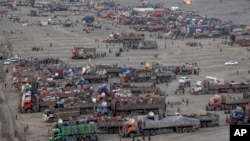Pakistan’s Supreme Court asked the government Friday to respond to questions raised over its policy of expelling Afghans residing illegally in the country, observing that Islamabad must abide by United Nations’ resolutions protecting refugees.
Holding the first hearing on a plea challenging the ongoing eviction of Afghans, a three-member bench of the top court sought responses from the federal government, the apex committee headed by the prime minister and army chief that decided to expel Afghan nationals, as well as the foreign office.
The petition filed jointly by more than a dozen politicians, lawyers and community activists last month calls the eviction a “massive violation of fundamental rights of around 4.4 million persons of Afghan origin [present] for the time being in Pakistan.”
Reeling from a wave of deadly terror attacks, Pakistan in October ordered all people residing there illegally to leave by November 1 or face deportation.
The order primarily affected 1.7 million Afghans living without proper documents. Nearly 700,000 Afghans have arrived since the Afghan Taliban took control of their country in August 2021.
So far, close to 400,000 have left Pakistan from border crossings in Khyber Pakhtunkhwa and Baluchistan provinces.
“The haphazard manner in which all Afghans are being shunted out of the country, this is absolutely wrong. It is in violation of their human rights. It is in violation of the international covenants,” Senator Farhatullah Babar, one of the petitioners, told VOA.
Criticizing the government’s strategy, Babar said the order was affecting those with legitimate asylum claims, while many with proper documents also were being pushed out.
Rejecting the allegation, Pakistani foreign ministry’s spokesperson Mumtaz Zehra Baloch said at a weekly media briefing that “the policy [of expulsion] pertains to those individuals who are in Pakistan in violation of immigration law.” Baloch, however, refused to address the court’s order seeking details, saying the matter was sub-judice, or in court.
Aid agencies, as well as local and international rights watchdogs, have criticized Pakistan’s plan, concerned that many Afghan returnees might face extreme poverty or retribution from the Taliban, while girls and women would be deprived of education and work opportunities.
Despite hosting one of the largest refugee populations in the world, Pakistan is not a signatory to the U.N.’s convention protecting refugee rights.
Rida Hosain, a Lahore-based lawyer, told VOA the courts still may apply principles of international law that support or do not contradict domestic laws. The South Asian country is party to the International Covenant on Civil and Political Rights, though, as well as the U.N. Convention Against Torture.
“This obligation extends to all residents of Pakistan, not just citizens,” Hosain said about the protections recognized in the U.N.’s resolutions that Pakistan signed.
Among those forced to leave because of a lack of documents are Afghans born in Pakistan to refugee parents. Many now have Pakistani-born children of their own who have little, if any, ties to their grandparents’ homeland.
“By all reckoning they should be treated as Pakistani nationals,” Babar said.
Although Pakistani law recognizes the right to citizenship for children born on its soil, this provision is not extended to Afghan families.
In 2018, then-Prime Minister Imran Khan announced his government would give citizenship to Afghans born in Pakistan. The hugely surprising statement was never turned into law.
Babar, a veteran politician, hinted that Pakistan’s powerful military manages the country’s foreign policy.
“The Afghan policy is not made by the civilian government,” he said. “It has never been discussed and debated in the parliament. The foreign office has little say in the formulation of the Afghan policy.”
The current caretaker government that made the decision to expel undocumented Afghans enjoys the military’s support. Petitioners argue, though, that it simply does not have the authority to formulate this policy of mass eviction. Hosain agrees.
“They are not elected, they don’t represent the people of Pakistan. So, the court would need to decide whether a caretaker government with such a restrictive mandate can take such a major policy decision, and in my view, this is beyond the power of the caretaker government,” she said.
So far, the caretaker government has claimed it is only applying the law of the land.
“The concept of the nation state is that illegal practices, illegal means, are not promoted in any country. We won’t allow that either,” Sarfaraz Bugti, the Pakistani interior minister, told VOA in October after announcing the policy.
Pakistan claims Afghan nationals were involved in several deadly terror attacks on civilians and security personnel this year. Islamabad also accuses the Afghan Taliban of taking insufficient action to curb cross-bordekakr terrorism. The de facto government in Kabul denies the charge.
Speaking to VOA last month, the Pakistani caretaker prime minister said the policy, which the Afghan Taliban rejected as inhumane, was meant to formalize movement between the two neighbors.
“We want to have a regulated movement interaction with Afghanistan as a state. This is the prime target,” Anwar ul Haq Kakar said.
A group of Pakistani academics has also petitioned the court against the expulsion of Afghans.
The hearing will resume next week in the Supreme Court.














